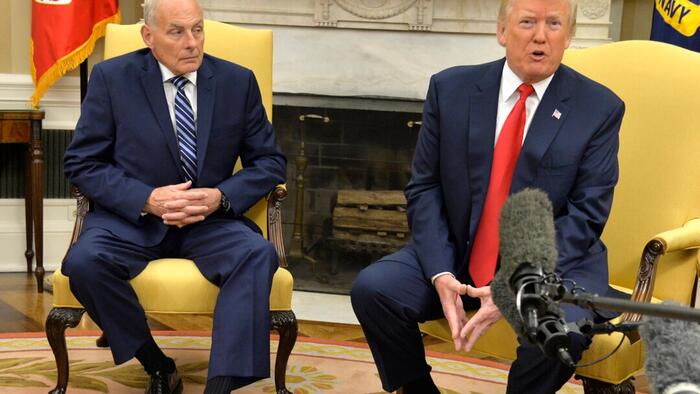In a recent series of interviews, former White House Chief of Staff John Kelly made contentious assertions about Donald Trump, drawing sharp rebukes from Trump and several of his former administration officials. Kelly, who served in the Trump administration from 2017 to 2019, characterized Trump with terms associated with fascism and alleged that Trump expressed a desire for leadership similar to that of Nazi Germany’s Adolf Hitler. These statements have ignited a backlash, as Trump’s allies, including Mike Pence’s former chief of staff Mike Ayers and Mark Paoletta, general counsel of the Office of Management and Budget, vehemently rejected Kelly’s comments, branding them as false and derived from a distorted agenda.
Trump himself took to social media platforms to counter Kelly’s allegations, stating that Kelly’s claims stemmed from what he called “pure Trump Derangement Syndrome.” On October 23, the former president felt compelled to speak out, demonstrating his dissatisfaction with Kelly’s remarks, particularly given the timing of the interviews, which occurred shortly before the critical upcoming elections in November. Trump suggested that this timing was strategic, aiming to damage his electoral prospects as he began gaining traction in key battleground state polls.
Adding to the discourse, Vice President Kamala Harris joined the fray by expressing her belief that Trump embodies fascist characteristics. This claim resonated across the political landscape, igniting responses from various quarters; notable among these responses was one from Robert F. Kennedy Jr. He cautioned that such divisive rhetoric could fuel animosity and promote violent actions, highlighting the potential danger of inflammatory language in political discourse.
The accusations against Trump included allegations that he made disrespectful comments about a deceased servicemember and displayed indifference toward funeral expenses for Vanessa Guillen, a soldier whose tragic murder in 2020 sparked widespread outrage about sexual harassment in the military. Trump dismissed these claims in a press conference in Austin, Texas, asserting that he was prepared to fund Guillen’s funeral personally if necessary. He expressed gratitude toward Guillen’s family for publicly denouncing the inaccuracies reported in media outlets, asserting that their statements contradictthe narratives presented by sources like The Atlantic.
On October 25, in a show of unity with the Guillen family, Trump highlighted their willingness to come forward and challenge media representations that he deemed misrepresentative. This familial support served to bolster Trump’s position against what he characterized as unfair and misleading press coverage as the electoral process intensified. By referencing the Guillen family’s response, Trump aimed to illustrate a disconnect between the media narratives and the reality experienced by those directly involved.
In conclusion, the ongoing feud between Trump and Kelly, punctuated by political allegiances and public statements, underscores the heightened tensions of an election campaign imbued with accusations and counter-accusations. The involvement of notable political figures, such as Vice President Harris and Robert F. Kennedy Jr., further amplifies the climate of division and controversy. As election day approaches, these dialogues continue to shape the public perception of Trump and the broader political narrative, making the ramifications of these exchanges critical not only for the individuals involved but also for the political landscape as a whole.

